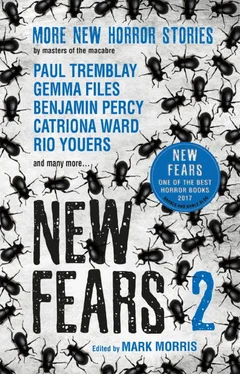“Hello?” he called again, louder this time, then listened. No answer.
Just me, then , he told himself. Though he wasn’t entirely sure it was just him. He groped for the top of his duffle bag and unzipped it, then took his glove off with his teeth so he could root around by touch inside. Lumps of cloth that were wadded dirty clothing, the squat cylinders of batteries, the thin length of a knife, a dented tin plate, a can of food. There it was, deep in the bag: a hard, long cylinder with a pebbled grip. He took it out, fiddled with it until he found the switch.
The flashlight beam came on, the glow low, battery nearly dead or the contacts corroded. He shook the flashlight a little and it brightened enough to cut through the dark.
He shined it about him, walking around. Ordinary room, it seemed. The only odd thing was how clean it was: no debris, no dust. The pine floors shone as if they had just been waxed. Immaculate. Had he been wrong in thinking the house deserted? But no, it had appeared ruined from the outside, and the windows were boarded.
Strange , he thought. And then the flashlight flickered and went out.
* * *
He shook it, slapped it with the heel of his hand, but it didn’t come on again. He cursed himself for having left his duffle bag near the window. He returned slowly backward in what he hoped was the direction he had come from, but darkness was making the space change, becoming uncertain, vast. He kept backing up anyway.
The back of his heel struck something. Feeling behind him he found a wall. Where was the window he had entered through? He couldn’t find it, there was just solid wall.
It’s just a house , he told himself. No need to worry. Just a house .
But he’d never been able to bear the dark. He hadn’t liked it when he was a boy and he didn’t like it now. He felt along the wall again. Still no window. He was hyperventilating, he realized. Take a breath , he told himself. Calm down .
He passed out.
* * *
When he woke up he was calm somehow, almost as if he were another person. He had none of the disorientation that comes with waking in a strange place. It was almost as if the place wasn’t strange after all—as if he’d been there a very long time, perhaps forever.
The stripes , he thought. And immediately he began to see them, the lines of grey that marked the windows. There were none near him—the wall he had been touching must have been an interior wall, he must have taken a wrong turn somewhere. How had he gotten so turned around?
He stood and made his way to them. Halfway there, he stumbled over something and went down in a heap. His duffle bag, he thought at first, but when he groped around on the floor for it, he found nothing at all. What had he tripped on?
He climbed to his feet. Once he’d touched the wall with the window in it, he swept his foot over the floor looking for his duffle bag, still not finding it. He tugged on the slats of wood over the window, but none were loose.
Wrong window , he thought. Wrong wall. He did his best not to panic.
Turning away from it, he peered into the darkness. He could just make out, at what seemed a great distance, another set of lines defining another set of windows. He made his way toward it.
* * *
The duffle bag was there this time—he stumbled on it, and when he felt around for it, it had the decency not to vanish. It felt just slightly wrong beneath his fingers, but that no doubt had come when he had forced it through the gap in the boards and let it drop. He shouldn’t worry, it was his duffle bag: what else could it possibly be?
Sitting cross-legged on the floor, he searched through it for the spare batteries and in a moment had them. He unscrewed the cap at the end of the flashlight. Shaking out the old batteries, he dropped them onto the floor with a clunk, then pushed the new ones in, screwing the cap back into place.
Carefully he pressed the switch, and this time the beam came on bright and strong. The room became a room again, boundaries clean and distinct. Nothing to be afraid of, just an ordinary room, empty except for him and his duffle bag.
He slung the bag over his shoulder and started toward the door that led deeper into the house. Halfway there, he stopped and, turning, swept the light across the floor behind him. The dead batteries, he wondered, where could they possibly have gone? They simply weren’t there.
* * *
The adjoining room offered a stairway and then narrowed into a passageway that led to the remainder of the ground floor. Here too everything appeared immaculate, the floor and stairs dustless, as if they had just been cleaned.
He shined the light up the stairway but didn’t climb it, instead following the passage back. After openings leading to a dining room, a kitchen, and a storeroom, the passage terminated in a series of three doors, one directly before him and one to either side. He tried the door to his right and found it locked. The one on the left was locked as well. But the door in front of him opened smoothly. He went through.
A fireplace dominated the room, a large ornate affair faced in porcelain tile. The grate and firebox were as clean as the rest of the house: spotless, as if a fire had never been made. There was a perfectly symmetrical stack of wood to one side, a box of kindling in front of it. On the other side was a poker in its stand, also seemingly unused. The porcelain of the tiles had been painted with what at first struck him as birds but which, as he drew closer, he realized were not birds at all but a series of gesticulating disembodied hands.
And there, on the wall above the mantel, what he took at first for a curious work of art: something seemingly scribbled directly on the plaster. Upon closer inspection, it proved to be a stain—the only blemish he had seen in the whole house. And then he came closer, and closer still, and recoiled: it was not just any stain, he realized, but the remnants of a great cloud of blood.
* * *
There were two armchairs here and a bearskin on the floor. He could light a fire and get warm. Did he dare start one? What if someone saw smoke coming up from the chimney? Would they cause trouble for him?
But his batteries wouldn’t last forever and the last thing he wanted was to be left in the dark again. No, he needed a fire. If he was caught, so what: it would mean a night in jail and then they’d let him go. And the jail would be warm.
He balanced the flashlight on its end so that the light fountained up toward the ceiling, then rummaged through his bag until he found his book of matches.
It was bent and crumpled, the striking pad worn along the middle of the strip through to the paper backing. Most of the matches were torn out and gone.
Carefully he arranged the split logs in a crosshatched stack, and then on top of this built a little mound of tinder. The mound looked, he realized, like a star, and once he’d noticed this he found his fingers working to make it even more of one.
The first match he struck fizzled out. The second did a little better, but the tinder didn’t catch. With the third, once the match was alight he lit the matchbook as well, pushing both into the tinder.
He blew on the flame until the tinder caught, watched it blacken and curl, charring its mark onto the pale wood below, and then that catching too. He stared into the flames. Soon he felt the warmth radiating from the fire. Soon after that, it was too hot to be so near.
* * *
He made his way back to one of the armchairs, but before he could sit in it realized there was something already there. A rubberized blanket perhaps, strangely shaped and nearly see-through. An odd colour, a dirty pink—pigskin maybe, cured in a way that gave it a translucency or stretched thin. It was soft to the touch, and warm—no doubt from the fire. He grasped it in both hands and lifted it, found it to be more a sheath than a blanket, something you could crawl into, as large as a man, roughly the shape of a man as well.
Читать дальше












